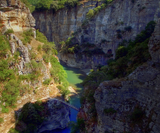Albania positioning itself as hydro export route to Italy
ICIS, Irina Peltegova and Sophie Udubasceanu
Prepared: 05 March 2015
The last week the Albanian government signed a memorandum of understanding with German engineering company Streicher to establish a consortium to develop the project (see EDEM 26 February 2015). The next step would be a feasibility study. Building a 400kV line between Italy and Albania is on the list of projects of Energy Community interest.
An undersea electricity interconnector between the two countries could be more feasible than a cable linking Montenegro and Italy, according to an Albanian energy expert. In the meantime the 1GW Italy-Montenegro project initially expected to launch this year has faced numerous delays because of the Croatian government’s decision to explore the potential for oil and gas basins located under its territorial waters. The latest deadline is set for 2018.
The laying of the infrastructure for the Trans Adriatic Pipeline (TAP) could cut the cost of building an electricity link between Albania and Italy, making it financially more viable, according to Lorenc Gordani, legal energy market advisor and project manager at the Albanian Centre for Energy Regulation and Conservation (ACERC). The initial estimated cost of the Albanian-Italian link is around €200m, according to the Albanian energy ministry. Italian transmission system operator (TSO) Terna had estimated a project cost of €760m for the cable to Montenegro.
Gordani also questioned the prolonged deadlines for the Montenegro cable. He suggested that the Albanian link could even launch first but it would need to attract private investment. New power plants will come online in Albania in the next few years, providing supply that could be exported. The Balkan country derives most of its electricity from 1.4 GW hydropower plants, according to ICIS data.
Turkish electricity producer Ayen Enerji is expected to commission the first 27.90MW plant of the 110.5MW Fan River hydropower project in Albania at the end of next month (see EDEM 11 February 2015). Norwegian energy producer Statkraft is also building a 256MW Devoll river hydro power project with the first 70MW expected to come online in the second half of 2016 (see EDEM 17 October 2014). There are another five hydropower projects with 1.1GW of installed capacity in the pipeline at early development stages financed by private investors, ICIS data shows. There are also plans to build gas-fired power generation capacity which would be fueled by gas imported via TAP.
A trader active on the Albanian power market said it was hard to assess a firm price spread between electricity delivered in Albania and Italy as the Albanian market is still underdeveloped while the country relies on imports, especially when hydro is low. But in any case the Italian prices would be at a premium. He noted that whenever Albanian state-owned utility KESH had excess of hydropower it would sell at prices below those in the Hungarian wholesale electricity market – the most liquid in the region. However, there is an export fee of €4.65/MWh that needs to be applied.
The Albanian government is in the process of discussing changes to the energy law and traders have been lobbying for the abolishment of the export fee, the source added.
In order to calculate an average Albanian power price, traders consider the Hungarian values for an equivalent delivery period and the cross-border costs for transmitting the power from Hungary to Albania. The average price for the Hungarian March ’15 Baseload was assessed at €37.28/MWh in February when the contract was the front month. The monthly cross-border capacity price in direction Hungary-Serbia was €0.11/MWh and in direction Serbia-Albania €0.58/MWh.
At the same time the average assessment of the Italian March ’15 contract stood at €49.73/MWh, putting Albania at a discount of €11.57/MWh.
A trader active on the Italian market said both interconnectors would be beneficial. Italy would be able to import cheap hydropower in the spring while the Balkan countries could also rely on flexible gas-fired power imported from Italy in certain periods, he said.
Note: ICIS is for subscribers only, then for a direct consulting of the article can be find very soon the extract of the interview in the Pdf in the official website of ACERC. The here article has been object of several publishing that can be find here, here, etc.
The network of the ACERC partners, supporters and sponsors include among others
For more about visit the dedicate section



















